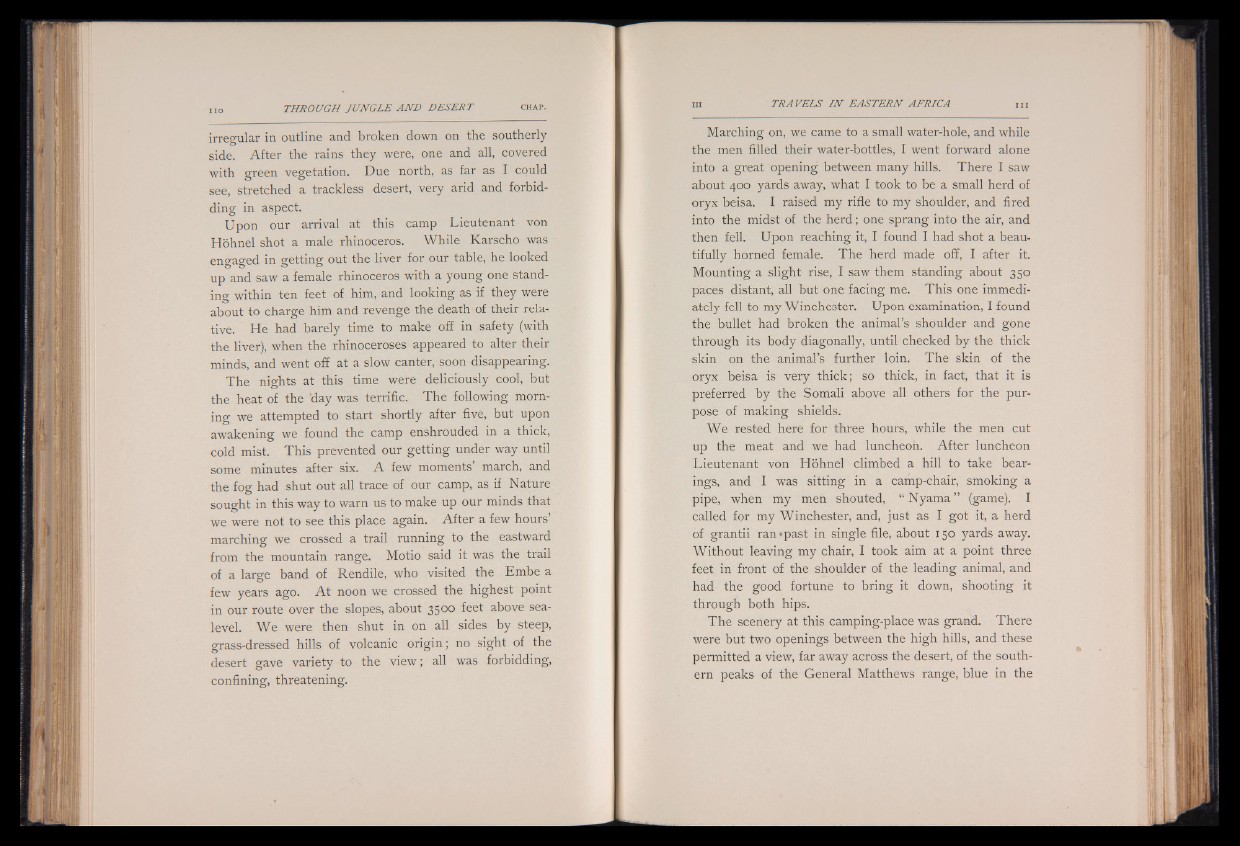
irregular in outline and broken down on the southerly-
side. After the rains they were, one and all, covered
with green vegetation. Due O o north, as far as I could
see, stretched a trackless desert, very arid and forbidding
in aspect.
Upon our arrival at this camp Lieutenant von
Hohnel shot a male rhinoceros. While Karscho was
engaged in getting out the liver for our table, he looked
up and saw a female rhinoceros with a young one standinOg
within ten feet of him, and looking as if the2y were
about to charge him and revenge the death of their relative.
He had barely time to make off in safety (with
the liver), when the rhinoceroses appeared to alter their
minds, and went off at a slow canter, soon disappearing.
The nights at this time were deliciously cool, but
the heat of the day was terrific. The following morning
we attempted to start shortly after five, but upon
awakening we found the camp enshrouded in a thick,
cold mist. This prevented our getting under way until
some minutes after six. A few moments’ march, and
the fog had shut out all trace of our camp, as if Nature
sought in this way to warn us to make up our minds that
we were not to see this place again. After a few hours’
marching we crossed a trail running to the eastward
from the mountain range. Motio said it was the trail
of a large band of Rendile, who visited the Embe a
few years ago. A t noon we crossed the highest point
in our route over the slopes, about 3500 feet above sea-
level. We were then shut in on all sides by steep,
grass-dressed hills of volcanic origin; no sight of the
desert gave variety to the view; all was forbidding,
confining, threatening.
Marching on, we came to a small water-hole, and while
the men filled their water-bottles, I went forward alone
into a great opening between many hills. There I saw
about 400 yards away, what I took to be a small herd of
oryx beisa. I raised my rifle to my shoulder, and fired
into the midst of the herd; one sprang into the air, and
then fell. Upon reaching it, I found I had shot a beautifully
horned female. The herd made off, I after it.
Mounting a slight rise, I saw them standing about 350
paces distant, all but one facing me. This one immediately
fell to my Winchester. Upon examination, I found
the bullet had broken the animal’s shoulder and gone
through its body diagonally, until checked by the thick
skin on the animal’s further loin. The skin of the
oryx beisa is very thick; so thick, in fact, that it is
preferred by the Somali above all others for the purpose
of making shields.
We rested here for three hours, while the men cut
up the meat and we had luncheon. After luncheon
Lieutenant von Hohnel climbed a hill to take bearings,
and I was sitting in a camp-chair, smoking a
pipe, when my men shouted, “ Nyama” (game). I
called for my Winchester, and, just as I got it, a herd
of grantii ran »past in single file, about 150 yards away.
Without leaving my chair, I took aim at a point three
feet in front of the shoulder of the leading animal, and
had the good fortune to bring it down, shooting it
through both hips.
The scenery at this camping-place was grand. There
were but two openings between the high hills, and these
permitted a view, far away across the desert, of the southern
peaks of the General Matthews range, blue in the